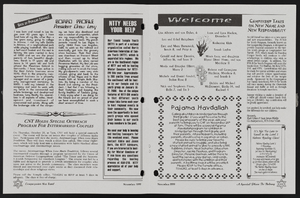Search the Special Collections and Archives Portal
Search Results
Joyce Helens and Sonja Sibert (Great Basin College) oral history interview conducted by Magdalena Martinez and Elia Del Carmen Solano-Patricio: transcript
Date
Archival Collection
Description
From the Lincy Institute "Perspectives from the COVID-19 Pandemic" Oral History Project (MS-01178) -- Education sector interviews file.
Text
Strutt Hurley Collection on the Southern Nevada Association of Pride, Inc. (SNAPI) and Las Vegas Gay Pride
Identifier
Abstract
The Strutt Hurley Collection on the Southern Nevada Pride Association, Inc. (SNAPI) and Las Vegas Pride (1989-2000) contains materials collected and produced by Strutt Hurley during her tenure as Director of Entertainment of SNAPI. Materials include meeting minutes, advertising contracts, Las Vegas Pride programs, and ephemera collected from Pride celebrations in Las Vegas, Nevada and other parts of the United States and the world.
Archival Collection
Christie Young Papers
Identifier
Abstract
The Christie Young Papers are comprised of Young's personal papers, journals, and photographs between 1982 and 2011. The journals document Young's arrival to Las Vegas, Nevada and her involvement in several nascent Las Vegas lesbian, gay, bisexual, transgender, and queer (LGBTQ) organizations from 1982 to 1985, such as UNLV's Lesbian and Gay Academic Union (LGAU). The collection includes materials related to her life in San Diego, California from 1985 to 1995 and typed transcripts of all journal entries that relate to the Las Vegas LGBTQ community. The collection also includes photographic slides and prints documenting Young's involvement with LGAU and events in the Las Vegas LGBTQ community.
Archival Collection
Alpha Kappa Alpha Sorority, Incorporated, Theta Theta Omega Chapter Records
Identifier
Abstract
The Alpha Kappa Alpha Sorority, Incorporated, Theta Theta Omega (AKA TTO) Chapter records (1965-2020) are comprised of organizational records, conference programs, digitized copies of the chapter's scrapbooks, and copies of
Archival Collection
Wilson Family Papers
Identifier
Abstract
The Wilson Family Papers (1875-1918) document the personal and professional lives of James B. Wilson Sr., James B. Wilson Jr., and George Twison "Tweed" Wilson, early pioneers in Southern Nevada. The collection is comprised of personal correspondence, invoices and advertisements from the Wilson family business, the Sandstone Ranch, and photographs of the extended Wilson family.
Archival Collection

Transcript of interview with Paul Senzaki, Alan Hess, and Charlie White III by Stefani Evans and Claytee White, September 9, 2016
Date
Archival Collection
Description
Architect Paul Senzaki, and artist-illustrator Charlie White III recall their experiences of working in Las Vegas: Paul on Treasure Island, The Palms, Fremont Street Experience, and World Market Center and Charlie on Treasure Island and its successor, TI; New York New York. Architectural historian Alan Hess, who is an expert on Las Vegas architecture, offers historical context and asks pertinent questions. While this interview touches on several iconic Las Vegas buildings, the conversation mostly details why and how Steve Wynn's Treasure Island involved the labors of artists, illustrators, art directors, and designers of stage and screen as well as the those of architects, contractors, planners, and subcontractors.
Text

Transcript of interview with Joanna S. Kishner by Barbara Tabach, January 10, 2017
Date
Archival Collection
Description
Joanna Kishner epitomizes the native Southern Nevada who was raised in both a Jewish and secular world of Las Vegas. A daughter of Ellen Neafsey Jobes and Irwin Kishner, she was born in 1964 and graduated from Clark High School in 1982. As she recalls, the halls of Clark High School witnessed a stellar cast of characters in the early 1980s, from future casino executives, to additional judges, to comedian Jimmy Kimmel. Judge Kishner earned a double major in Political Science and Psychology from Claremont McKenna College (1986) and graduated from UCLA School of Law (1989.) She remained in California and worked as senior counsel for Warner Brothers, a division of Time-Warner Entertainment Company and was also an associate with the multi-national firm Paul Hastings Janofsky & Walker. In time, she felt the tug to return to her childhood roots in Las Vegas. She and her husband were married at Temple Beth Sholom, where she had her bat mitzvah and raises her own children in the Jewish tradition. Judge Kishner has been recognized for her legal work throughout the years, this includes pro bono work for disadvantaged children through the Children’s Attorney Project. When she set her sights on becoming a judge, she was joined by her young family as she knocked on thousands of doors to introduce herself and her passion for justice. In 2010, she was elected to Department XXXI of the Eighth Judicial District.
Text

Transcript of interview with Sonja Saltman by Barbara Tabach, August 18, 2015
Date
Archival Collection
Description
Included in this oral history are reminiscences of Sonja Saltman's personal non-Jewish heritage in Austria, the importance of her grandmother in her life, and how she recalls becoming part of the Jewish community.
Sonja Saltman is a psychologist and philanthropist in Las Vegas, Nevada. She is executive director and co-founder of the Existential Humanistic Institute, a non-profit organization based in San Francisco, California that offers training in existential-humanistic therapy and theory. In 2003 Sonja and her husband Michael Saltman founded the Saltman Center for Conflict Resolution at the University of Nevada, Las Vegas (UNLV) William S. Boyd School of Law. The Saltman Center is focused on research, teaching, and public service related to "the advanced study of the nature of conflict and how to resolve it." A native of Austria, Sonja Saltman also serves as the Honorary Consul for Austria in Las Vegas. The Saltmans are involved with multiple charitable organizations and initiatives, both locally and abroad. Sonja Saltman has served on the boards of the Anti-Defamation League, Nevada Women's Philanthropy, and the Black Mountain Institute. Projects that the couple has supported include the rebuilding of homes and bridges is Bosnia, and Streetball Hafla, a basketball program to improve relations between Jewish and Arab teenagers in Israel. In 2014 Sonja and Michael Saltman were recognized as Distinguished Nevadans by the Nevada System of Higher Education. Included in this oral history are reminiscences of her personal non-Jewish heritage in Austrian, the importance of her grandmother in her life, and how she recalls becoming part of the Jewish community.
Text


